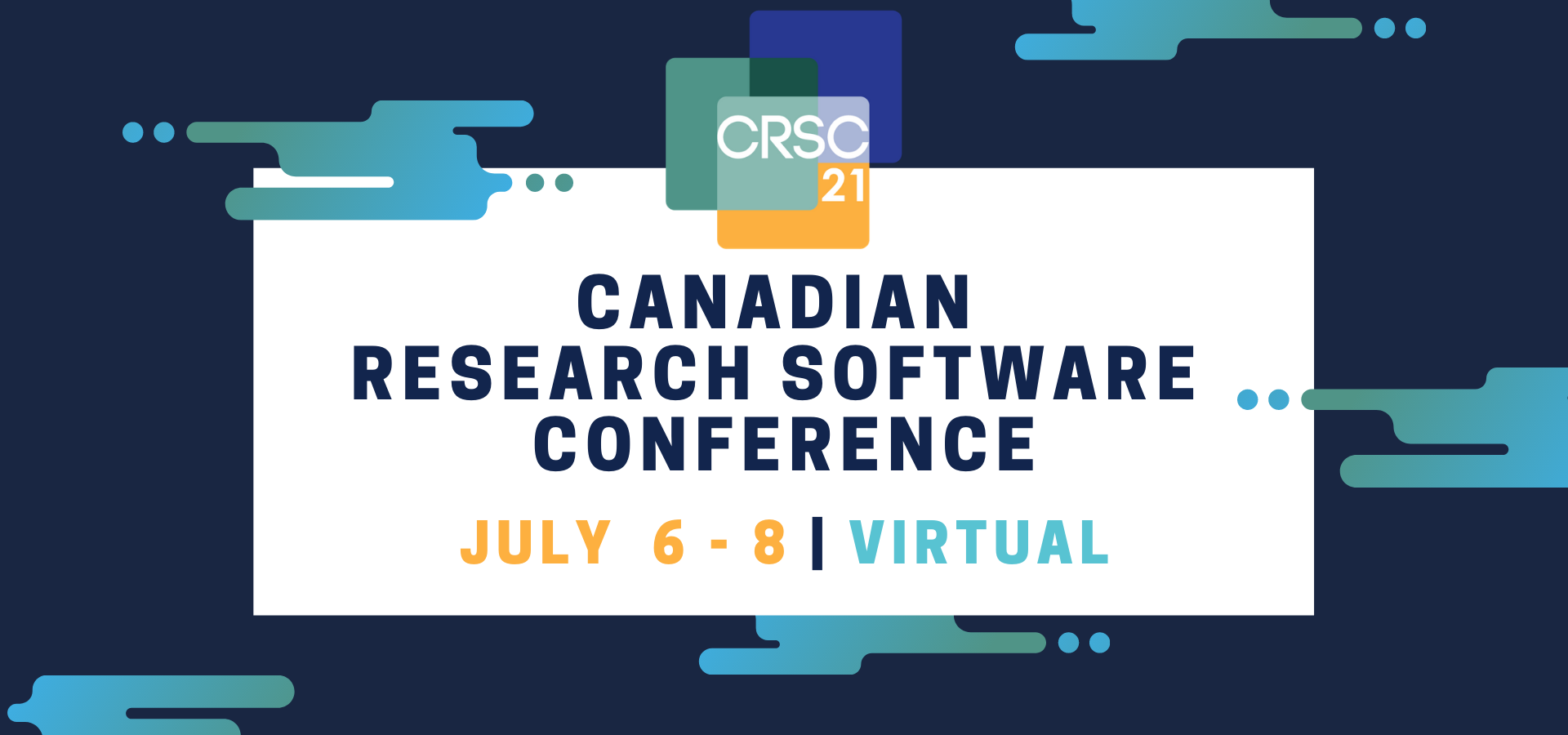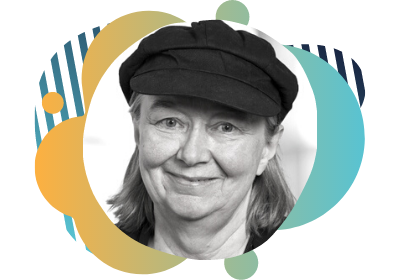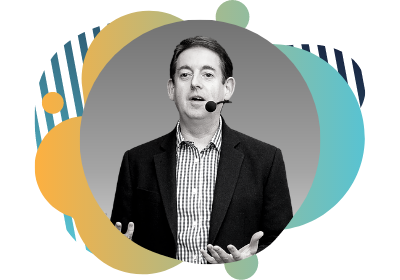How can you contribute?

Who should attend?
- Developers of research software (regardless of job title)
- Computational researchers
- Students with an interest in computational research
- Developers of open source software to support research
- Researchers with an interest in software development
Why should you attend?
- To learn, collaborate, exchange ideas, and discuss common issues affecting software development for academic research
- To further build a cohesive Canadian community of academic research software developers
- To strengthen the impact of public funds for research
Highlights from the last Canadian Research Software Conference…

Speakers
Please check back often for an updated list of speakers.

Dr. Joanne Atlee
Professor and Director of Women in Computer Science | University of Waterloo
Dr. Joanne Atlee (P.Eng) is a Professor in the David R. Cheriton School of Computer Science at the University of Waterloo, where she is the Director of Women in Computer Science and the founding Director for the Software Engineering program. She has 25+ years experience in software requirements modelling and analysis, with an emphasis on detecting and resolving feature interactions. Much of her research is with industrial partners who work on safety-critical software, such as telecommunications and automotive software. She is a co-author with Shari Lawrence Pfleeger on their textbook “Software Engineering: Theory and Practice,” is an ACM Distinguished Scientist, and is the 2020 recipient of the IEEE CS TCSE Distinguished Women in Science and Engineering (WISE) Leadership Award.

Dr. S
Professor, School of Computing Science | Simon Fraser University
Sheelagh Carpendale is a Professor and Canada Research Chair in Information Visualization in the School of Computing Science at Simon Fraser University. She leads the Innovations in Visualization (InnoVis) Research Group and has newly established the Interactive Experiences Lab (ixLab). Her research on information visualization, interaction design and qualitative empirical research draws on her dual background in Computer Science (BSc. and Ph.D.) and Visual Arts (Sheridan College, School of Design and Emily Carr, College of Art). By studying how people interact with information in both work and social settings, she works towards designing more inclusive, accessible and understandable interactive visual representations of data. She combines information visualization and human-computer interaction with innovative new interaction techniques to better support the everyday practices of people who are viewing, representing, and interacting with data. She has been inducted into both the IEEE Visualization Academy and the ACM CHI Academy and has received many awards including the IEEE Visualization Career Award, an NSERC STEACIE (a top science award in Canada); a BAFTA (the British equivalent to an Oscar); an ASTech Award Innovations in Technology; two Best Supervision Awards; and the Canadian CHCCS Achievement Award.

Assistant Professor, Computer Science | University of Victoria
Dr. Neil Ernst is Assistant Professor of Computer Science at the University of Victoria. Prof. Ernst and his students work at the intersection of software requirements and software design. His research leverages past experiences consulting with large government stakeholders. Current projects include analyzing software design discussions, technical debt in software, and engineering challenges in data science systems. Previously he was a senior researcher at the Software Engineering Institute, Carnegie Mellon University, and holds a PhD from the University of Toronto.

Chief Technology Officer | Endava
Eoin Woods is the CTO of Endava, the NYSE listed software engineering services company, where he is responsible for technical strategy, capability development and emerging technologies. Prior to joining Endava, Eoin has worked in the software engineering industry for 20 years developing system software products and complex applications for capital markets. His main technical interests are software architecture, software security, DevOps and software energy efficiency. He has regularly spoken and written about these areas in both practitioner and research communities. He is the co-author of two books on software architecture and was the recipient of the 2018 Linda Northrup Award for Software Architecture, from the Software Engineering Institute at Carnegie Mellon University.
Program
Please check back often for Program updates. Please note that simultaneous French interpretation will be offered for keynote presentations.
Tuesday, July 6
| 12:00 – 12:15 p.m. ET | Opening Remarks | Jim Ghadbane President and CEO, CANARIE Scott Henwood Senior Director, Programs, CANARIE |
| 12:15 – 1:15 p.m. ET | Opening Keynote: Building Applications Securely Security is now everyone’s problem, not just something that people who work for banks or Facebook need to worry about. This talk explains how to integrate security into the day-to-day work of a busy software delivery team, the practices that are important to understand, the (limited) role of tools, and how to ensure that every build is as secure as possible. The talk will recap security fundamentals, explain the tools and practices that help teams to increase the security of their software and how development teams can integrate these into their normal work. Technical examples will be Java centric, but the approach is equally applicable to other technology stacks. | Eoin Woods Chief Technology Officer, Endava Video Recording Download the presentation |
| 1:15 – 1:30 p.m. ET | Networking Break & Poster Competition | |
| 1:30 – 1:50 p.m. ET | How We Automated our Software Development Cycle Using GitHub Actions Open-source software development involves many steps: development, testing, and deployment. There are many web services such as Travis-CI that provide free continuous integration support for open-source projects. As for deployment, this is usually a manual process initiated by the package authors every time a new release is out. In this talk, we show how we used GitHub Actions to achieve these goals all in one place in a fully automated way for our open-source projects: OpenPNM and PoreSpy. | Mohammad Amin Sadeghi University of Waterloo |
| 1:50 – 2:10 p.m. ET | Bringing your Friendly Neighborhood ARC Cluster Software Environment Home Compute Canada offers over 1000 different research software packages to be used on its infrastructure. This environment is designed to be portable and optimized for various hardware. In this talk, we will present how you can take advantage of it in mere minutes on your own computer. This lets you focus on your own code and allows university IT to leverage our work while ensuring researchers are able to seamlessly transition from local infrastructure to large national clusters. | Maxime Boissonneault Compute Canada | Calcul Québec, Université Laval |
| 2:10 – 2:30 p.m. ET | Automated Deployment for Better Return on Investment To the end user, a bug fix is not fixed unless it is deployed and in operation; so, we have better return on investment (ROI) if we can deploy faster and more frequently. When developers can push fixes directly to production, they feel empowered. We promote end-to-end code ownership from inception all the way to deployment. This talk shows how we have achieved that with our PAVICS stack. | Long Vu Ouranos Video Recording Download the presentation |
| 2:30 – 2:45 p.m. ET | Networking Break & Poster Competition | |
| 2:45 – 3:45 p.m. ET | Keynote: Feature-Oriented Requirements: the Good, the Bad, and the Ugly A software system is often thought of in terms of its constituent features. Features are often treated as separate entities that are developed in relative isolation or are supplied by third-party vendors. The challenge is that seemingly independent features may interact with each other in subtle and surprising ways. For example, a new feature may override existing behaviour, violate invariant properties, or refine specifications of how a feature ought to behave. This presentation will look at feature modularity, the feature interaction problem (which is NOT that features sometimes interact), and current research on resolving interactions. | Dr. Joanne Atlee Professor and Director of Women in Computer Science, University of Waterloo Video Recording Download the presentation |
Wednesday, July 7
| 12:00 – 1:00 p.m. ET | Keynote: Technical Debt (TD) in Practice: Tools and Techniques for Identifying, Fixing, and Managing TD in Research Software Technical debt is common in all software (yes, research software too!). In this talk, Neil explains some of the tools and techniques for identifying, remediating, and managing technical debt. He will begin with a short summary of the state-of-the-art in academic and industry understanding of TD, and explain how a simple mental model of TD helps us to figure out what needs to be prioritized. Neil will also make the case for why TD is really more than just poor coding practice, using anecdotes and studies to ground his explanations. The presentation will conclude with some practical and tangible approaches to fixing TD issues in a research computing project, and importantly, how to sell the importance of the problem to stakeholders. | Dr. Neil Ernst Assistant Professor, Computer Science, University of Victoria Video Recording Download the presentation |
| 1:00 – 1:15 p.m. ET | Networking Break & Poster Competition | |
| 1:15 – 1:35 p.m. ET | The Three « Arrrs » of Vulnerable Data – Retirement, Reorganization and Restructuring Do you have issues with « vulnerable data » – datasets that are at risk of loss? In the context of environmental data, there are senior scientists and practitioners who collected data over many years but never took the time to properly archive their media. Significant datasets may reside on aging or obsolete equipment and remain inaccessible to other researchers. The objective of this presentation is to raise awareness of the issues and encourage discussion of approaches to addressing it. | Doug Mulholland University of Waterloo Video Recording Download the presentation |
| 1:35 – 1:55 p.m. ET | Enhancing the Performance of Data Intensive Systems: Filtering and Indexing Reducing the processing latency of data intensive applications is crucial in addressing the challenges of big data systems. This talk will present two techniques that we have researched: (i) a Spark-based parallel technique for filtering and storing user preferred data; and (ii) a novel, graph-based data indexing technique (devised in collaboration with Telus). Our experience, based on prototype implementation and measurement, demonstrates the high system performance achieved with these techniques. | Shikharesh Majumdar Carleton University Video Recording Download the presentation |
| 1:55 – 2:15 p.m. ET | FRDR Map Search — New Developments in Geospatial Data Discovery for Canadian Research Data With the rapid proliferation of research data, it is vital to create innovative tools for data discovery and access. This is the goal of Portage’s FRDR Map Search (previously Geodisy) project, an open-source spatial discovery tool for Canadian interdisciplinary open research data. FRDR Map Search provides a map-based search available alongside the Federated Research Data Repository (FRDR), a national geospatial discovery layer indexing over 80 Canadian open data repositories. | Paul Dante and Mark Goodwin University of British Columbia Video Recording Download the presentation |
| 2:15 – 2:30 p.m. ET | Networking Break & Poster Competition | |
| 2:30 – 2:35 p.m. ET | Linked Data Technologies for Canadian Humanities Research Infrastructure The Linked Infrastructure for Networked Cultural Scholarship (LINCS) project is converting and publishing humanities datasets as linked open data. This Infrastructure utilizes Compute Canada resources with Kubernetes microservices for data conversion, and the Researchspace platform for storage and publishing. This overview will demonstrate how free, open-source technologies, combined with linked data standards, are creating a trustworthy infrastructure for Canadian humanities research data. | Zachary Schoenberger University of Victoria Video Recording Download the presentation |
| 2:35 – 2:40 p.m. ET | Open-source Tools for Topological Data Analysis Topological data analysis (TDA) is a statistical learning technique to analyze underlying shapes and relationships in high-dimensional complex data. Specifically, TDA calculates topological invariants of graphs as a function of a filtration parameter. This analysis has many potential implications, and there are many open-source tools available to implement TDA with very little mathematical background required. I will present some of these tools and how I use them for 3D magnetic resonance (MR) image analysis. | Calder Sheagren University of Toronto Video Recording |
| 2:40 – 2:45 p.m. ET | Peer-to-peer Privacy Preserved Record Linking Typically, health research studies can store limited PHI to link with other data repositories (e.g., CIHI). Current solutions work for prospective studies only and require third-party entities to hold private keys. These require institutional security teams to audit, install, and manage software for linking, and current cloud solutions store data on their servers, which increases risks. In this talk, I propose a solution: Peer-to-peer deterministic/probabilistic cryptographic linking via web-browsers. | Francis Jeanson Datatex Video Recording Download the presentation |
| 2:45 – 2:50 p.m. ET | Research Stack: Learning & Research Simplified Research Stack is a vision for the community of the future, based on the developmental opportunities in the research world. With cloud-enabled tools and techniques for managing experiments, Research Stack could make it easy for stakeholders to investigate phenomena with the click of a button. Pupils to professionals could explore wide-ranging phenomena, including economic growth to scientific discovery, while consuming fewer resources, and speed up the discovery process of human endeavour. | Raju Basumatary License Academy Video Recording |
| 2:50 – 3:10 p.m. ET | DataHarmonizer: A Template-Driven Spreadsheet Application Utilizing Ontologies to Implement the Canadian COVID Genomics Network (CanCOGeN) Specification The sequencing and sharing of viral genomes and associated contextual data has been a significant challenge for the SARS-CoV-2 pandemic public health response. DataHarmonizer was developed to address this need and improve data quality. It is a secure, template-driven JavaScript spreadsheet application that runs in a browser locally. It utilizes an ontology-driven data specification, facilitating the creation of interoperable and comparable datasets from disparate sources across Canada. | Rhiannon Cameron and Damien Dooley Simon Fraser University Video Recording |
| 3:10 – 3:30 p.m. ET | Innovations in Message Passing Interface (MPI) and network design to address congestion in multi-workload HPC environments Research software and workload performance can be substantially impacted by network congestion and performance in HPC clusters. Reducing network congestion is not only about good network management and design; software has the ability to “shape” the network traffic flows and improve workload completion times in collaboration with the network. This presentation offers recent innovations and insights on the Ohio State University (OSU) MVAPICH Message Passing Interface (MPI). | Dr. D. K. Panda Ohio State University Matthew Williams Rockport Networks |
| 3:30 – 3:50 p.m. ET | Searching the Cosmos with CHIME/FRB The Canadian Hydrogen Intensity Mapping Experiment is a novel radio telescope with no moving parts. Scanning the sky at >8Tbps, it has processed more than half an exabyte of data in search for extremely bright, millisecond duration events called Fast Radio Bursts, increasing the number of detections by 10x in one year. In this talk we will explore the technologies employed to make a project of this scale happen and touch on the challenges and rewards of developing software for academic research. | Shiny Brar McGill University |
Thursday, July 8
| 12:00 – 1:00 p.m. ET | Data Visualization for Empowerment and Inclusion Dr. Sheelagh Carpendale is passionate about the impact of data visualization for empowerment and inclusion. In this talk, Sheelagh will discuss the moments in her research history that led her to change the way she thinks about data, and step through the process of discovering the importance of how to make visualizations more empowering, engaging, and expressive so they can work better for us as externalizations. Building upon these points will be a discussion about data feudalism and the importance of us staying connected to our data heritage. | Dr. Sheelagh Carpendale Professor, School of Computing Science, Simon Fraser University Video Recording Download the presentation |
| 1:00 – 1:15 p.m. ET | Networking Break & Poster Competition | |
| 1:15 – 2:35 p.m. ET | Local Research Software Support Presentations Starting with a pilot in 2018, CANARIE has funded teams of research software developers at academic institutions across Canada. These teams are composed of dedicated research software professionals and assist researchers at their institutions with research software needs, regardless of discipline. In this session, these teams will talk about who they are and how they work. | |
| 2:35 – 3:00 p.m. ET | Local Research Software Support Panel Discussion In this session, the teams who presented above will take questions from the audience. If you are part of a similar team and want to know how they manage specific issues or if you are considering starting a similar group at your own institution and would like to know more, this session is not to be missed. | |
| 3:00 – 3:05 p.m. ET | Upcoming Events and Poster Contest Results | |
| 3:00 – 3:15 p.m. ET | Closing Remarks | Mark Wolff Chief Technology Officer, CANARIE Scott Henwood Senior Director, Programs, CANARIE |
Registration
All fees are in CAD and are subject to HST.
- Short Talks: 15 minutes plus 5 minutes for Q&A
- 5-minute Lightning Talks: Share your ideas with the group quickly through a super-short talk (perfect for new presenters)
- Poster Competition: Students or those starting a career in software development can enter a poster in the competition. Prizes will be awarded to the top three (3) entries as voted by conference attendees.
Call for Presentations
The Call for Presentations is now closed.
Research software developers, computational researchers, and students are invited to submit proposals for presentations at the Canadian Research Software Conference. Topics may include discussions of your current project, a challenge you are facing in your current project, or topics related to the development of software for academic research that you wish to discuss with conference attendees.
Proposals for both Short Talks and Lightning Talks are welcome from both individuals and groups. All those selected to speak at the conference will receive complimentary registration. Slides must be in PowerPoint or PDF format.
Submission Guidelines
All submissions must include:
- Name, Title, Email address, and Organization of presenter(s)
- Type of talk (short or lightning)
- Bio for each presenter (maximum 300 characters)
- Presentation abstract (maximum 500 characters)
Evaluation Criteria
The following criteria will be used to select presentation proposals:
- Relevance of the topic to the Canadian research software development community
- Clarity of the proposal
- Uniqueness/originality of the topic
Key Dates
Submission Deadline – at 5 p.m. ET
juin 16, 2021
Notification of successful submissions
juin 18, 2021
Pre-recording of selected presentations. Live presentations during the event will also be possible. Week of:
juin 28, 2021
Call for Posters
The Call for Posters is now closed.
If you are a student or a research software developer early in your career, you are encouraged to participate in the Poster Competition. Topics for posters may include discussions of your current project or other topics related to the development of software for academic research that you wish to discuss with conference attendees. Posters will be on display during both days of the conference, with poster sessions during coffee and lunch breaks.
All conference attendees will vote on the posters, with prizes awarded during the closing remarks at the end of day 3, on July 8, 2021.
Prizes
- 1st Place: $500 Amazon.ca Gift Card
- 2nd Place: $350 Amazon.ca Gift Card
- 3rd Place: $150 Amazon.ca Gift Card
Submission Guidelines
Submissions must include:
- Name, Title, Email address, and Organization of presenter(s)
- Bio for each presenter (maximum 300 characters)
- Poster abstract (maximum 500 characters)
Please note: For those selected, posters should be a high-resolution PDF in landscape mode. Posters must be legible to conference attendees using a variety of devices.
Evaluation Criteria
The following criteria will be used to select posters proposals:
- Relevance of the topic to the Canadian research software development community
- Clarity of the proposal
- Uniqueness/originality of the topic
Key Dates
Submission Deadline – at 5 p.m. ET
juin 16, 2021
Notification of successful submissions
juin 18, 2021

